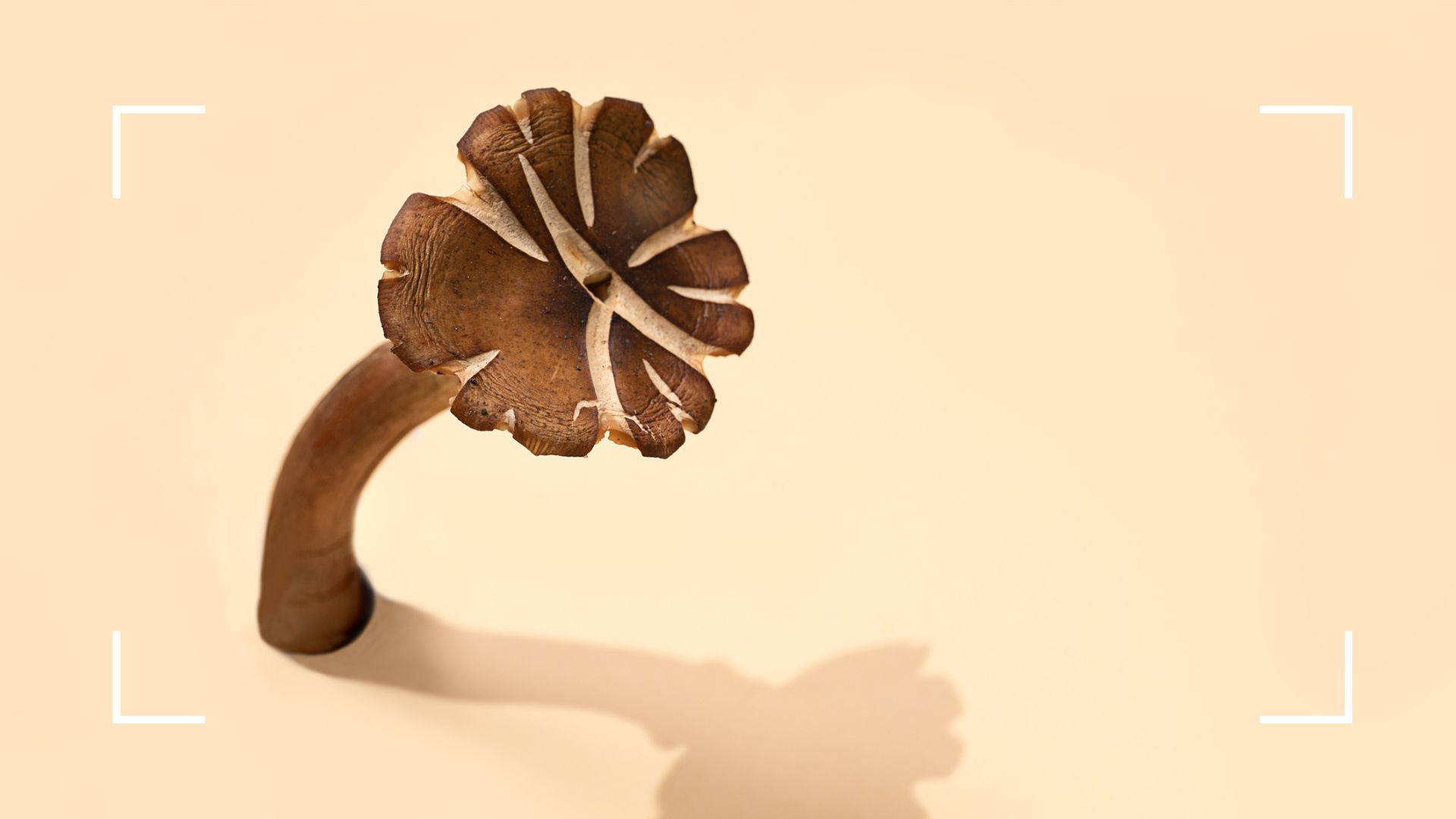Why I switched to mushroom coffee for a week - and the 5 benefits it had
Wondering if you should switch to mushroom coffee? Here are the five benefits I experienced


Mushroom coffee could be a good switch for you if you're sick of feeling jittery and tired, even after a cup of coffee. While the adaptogen brew is certainly not a new invention, it’s how more people are choosing to switch up their wake-up routines.
Drinking mushroom coffee exclusively, even for a week, wasn’t a decision I took lightly though. Like many other regular caffeine consumers, my day doesn’t really start until the espresso machine has been turned on, or I’ve stopped by my favorite local coffee shop to pick up an americano. My daily coffees are as much a ritual as a way to physically get moving in the morning.
While I’m fully aware of what too much caffeine does to the body, I wouldn’t say that I experience the downsides too often. I stick to a maximum of three cups a day and tend to just have single or double shots.
But as a coffee lover and someone who's always looking for ways to improve their health, I had to give adaptogens and their supposed benefits a try. This is what I learned after switching to mushroom coffee for a week.
What is mushroom coffee?
Mushroom coffee is a blend of regular coffee, often freeze-dried or in ground form, and ground medicinal mushrooms of various varieties. When brewed together, they create a rich, dark, earthy flavor that’s not dissimilar to a standard cup of black coffee.
The mushrooms used to create the coffee aren’t the ones you’d buy in the grocery store though. They’re medicinal mushrooms, extracts of which have been utilized in various traditional medicines for thousands of years.
Popular mushroom coffee blends include:
Sign up for the woman&home newsletter
Sign up to our free daily email for the latest royal and entertainment news, interesting opinion, expert advice on styling and beauty trends, and no-nonsense guides to the health and wellness questions you want answered.
- Cordyceps
- Chaga
- Lion’s mane
- Reishi
- Turkey’s tail
These types of mushrooms fit into the category of adaptogen foods, a group of herbs and fungi that help the body beat stress on a physical level. As one of the few studies on adaptogens by the Swedish Herbal Institute explains, nutrients in these work on the hypothalamus in the brain, the pituitary gland, and the adrenal glands to reduce the amount of cortisol and adrenaline, otherwise known as stress hormones, pumping around the body.
Do they actually work though? I switched out my regular three cups of coffee a day for London Nootropics' selection of mushroom coffees to find out. To get going in the mornings, I had a sachet of the Mojo blend which contains cordyceps mushroom and Siberian ginseng. Afternoons were for the Flow blend, which contains Lions Mane mushroom and Rhodiola. If I had another one later on in the day, I had a sachet of the Zen blend, designed for calm with all the benefits of CBD and Ashwagandha.

Benefits of mushroom coffee
1. Reduce stress
One of the supposed health benefits of mushroom coffee is its ability to reduce our stress levels. I have a fairly high caffeine tolerance and over the years, I've learned how to deal with stress and handle stressful situations relatively well. One of those ways is staying completely away from coffee - no matter how tired I am.
Instead of making me feel alert, awake, and ready to work, I find myself physically tense up and I feel so much worse off than before. So during a particularly long day, it was refreshing to actually have a coffee without the inevitable teeth-clenching, even-more-stressed-out feeling that always comes afterward.
But as mushroom coffee still contains caffeine, which spikes our cortisol levels, how does this work? Adaptogens like Cordyceps mushrooms and Ashwagandha, present in many of these alternative coffee blends, work as they influence the hypothalamic-pituitary-adrenal system (the HPA axis) and other key producers of the body's response to stress, promoting stable cortisol and adrenaline hormone levels. As several studies, including one in association with the Chinese Academy of Medical Sciences explains, this improves our temporary ability to handle stress.
“Adaptogens can help to balance cortisol levels while maintaining coffee’s more useful benefits," explains Zain Peer, co-founder of London Nootropics. "Many of our customers usually sensitive to caffeine find they enjoy our blends, especially Zen."
2. Feel energized
But I still felt like I'd been given a jolt awake, as ultimately, mushroom coffee still contains caffeine. In combination with the mushrooms, however, I felt like it was a slower release with a more mellow outcome compared to how it feels post-double espresso.
Caffeine, research from Osaka Bioscience Institute explains, helps to keep us awake and alert as it blocks receptors in the brain called adenosine receptors, which help to promote sleep. As one of the healthy alternatives to coffee in its regular form, mushroom coffee offers the feeling of alertness without the jitteriness of regular coffee thanks to the inclusion of the adaptogens.
A post shared by London Nootropics (@london.nootropics)
A photo posted by on
3. Sleep better
Learning how to sleep better was one of my goals for the year, after a chaotic few months under lockdown where the lack of routine played havoc with my sleep schedule. Unfortunately, as I've been awake later in the evenings, I am prone to work against myself with a post-9 pm coffee. This naturally doesn't help promote good quality sleep just a few hours later, since caffeine stays working in the body for up to five hours, the American Academy of Sleep Medicine says.
Switching to mushroom coffee for the week was a great way to combat this in two ways. Firstly if I was at home and I wanted a pick-me-up later in the evening, London Nootropics' Zen coffee is great for late-night drinking as it contains caffeine but is complete with all the benefits of CBD and Ashwagandha. Both, studies from the University of Colorado and D.Y. Patil University School of Medicine have shown, help to induce a better night's sleep due to the plant and shroom's respective properties.
And secondly, if I was out and about, the chances of a restaurant offering up a mushroom coffee after dinner was nil. Despite being one of the biggest coffee trends of the year, it hasn't quite hit the mainstream yet. So I'd be forced to ride out the energy dip by doing what my body needed - going to bed earlier.
4. Better gut health
While mushrooms are generally known to promote bloating, that certainly wasn't my experience during the mushroom coffee swap. I don't normally eat plates of high-carbohydrate foods as they tend to make me feel uncomfortable and bloated, then exhausted a couple of hours later thanks to the fall in blood sugar level.
After one particularly carby breakfast though, I had a cup of Mojo coffee and felt completely fine. No bloat in sight and I didn't feel the need for a lunchtime nap. This could be because mushrooms have naturally-occurring bacteria in them that help the digestive system run smoother, a review from Jiangnan University points out.
I only swapped to mushroom coffee for a week so I can't personally comment on the longer-term benefits, but the same review also suggests that the prebiotics and polysaccharides in mushrooms contribute to the production of gut flora and bacteria over time as well. So if you're looking for easy ways to improve your gut health, swapping to mushroom coffee could be one thing to try.
Of course, you could get this dose of prebiotics from any kind of mushroom in any form, coffee or otherwise. If you're not a big fan of mushrooms though, this is a great way to introduce a new source into your diet without having to fully convert. While the taste is certainly earthier than traditional coffee, it's not so reminiscent of the mushrooms you have on toast that it's off-putting.
5. Keep full
Medicinal mushrooms including Lion's mane and Cordyceps, two of those found in the blends I tried, are known to be particularly high in fiber. Not only that, a review by Mexico's Centro de Investigación y de Estudios Avanzado confirms that all edible mushrooms are high in protein, fiber, vitamin, and mineral contents.
This would explain why, as well as aiding digestion, I found that drinking mushroom coffee helped me stay fuller for longer. I'm a big fan of a post-3 pm snack and, normally, I'd opt for something with the best protein powders in it to make sure that I can get through the rest of the day before dinner. But when I switched to mushroom coffee in the afternoon, I noticed that the craving had partially gone - it was just the habit that I had to kick.
Mushroom coffee, or any drink of any kind, is not an adequate replacement for food. I only stayed full for an hour or so longer than I would normally. But if you're looking for ways to get into a calorie deficit for weight loss in a healthy way while still enjoying the food you love, for example, it may be something to consider.

What does mushroom coffee taste like?
Mushroom coffee tastes very similar to regular coffee, except it's often always earthier in taste with a nuttier texture. There's no hiding it, you definitely know that you're not just drinking normal coffee, but you can lessen the punchy flavor and aroma by adding any kind of milk.
As well as sampling London Nootropics, I've also tried various other mushroom coffee blends to get a full idea of what the brew tastes like - including the popular Four Sigmatics' mushroom coffee and DIRTEA's luxury blends.
Personally, because of the slightly alternative taste, I'd be hard-pressed to give up my regular coffee for good. For me, there's nothing that quite beats the taste of traditional barista-style coffee with its smooth finish. Despite drinking it every day for a week in various forms, with and without milk, I couldn't get used to the intense, woody flavor and different smell.
However, if I'm feeling a little stressed out, I won't hesitate to make the switch back temporarily, as there's no denying that I felt calmer and experienced fewer negative side effects.
Does mushroom coffee have side effects?
Multiple studies, including ones by National Yang-Ming University and Chung Shan Medical University, have attested that adaptogen mushrooms are generally safe when taken as a supplement as part of a healthy diet.
However, some people will experience side effects. Medline suggests that reishi mushrooms can cause dizziness and headaches. It's also not a mushroom that's suitable for those with particular medical disorders, including those taking blood-pressure medications, anyone who is pregnant or breastfeeding.
Research around mushroom coffee in particular is also limited. If you're considering switching to mushroom coffee, always consult your doctor first.

Grace Walsh is woman&home's Health Channel Editor, working across the areas of fitness, nutrition, sleep, mental health, relationships, and sex. She is also a qualified fitness instructor. In 2025, she will be taking on her third marathon in Brighton, completing her first ultra marathon, and qualifying as a certified personal trainer and nutrition coach.
A digital journalist with over seven years experience as a writer and editor for UK publications, Grace has covered (almost) everything in the world of health and wellbeing with bylines in Cosmopolitan, Red, The i Paper, GoodtoKnow, and more.
-
 Le Creuset has taken the gold standard literally — their 100 year launch features real gold and an iconic designer collaboration
Le Creuset has taken the gold standard literally — their 100 year launch features real gold and an iconic designer collaborationLe Creuset have turned 100 years old and to celebrate they have launched a new colour — Flamme Dorée — as well as a coffee table book with designers Assouline
By Laura Honey Published
-
 This chic, Brazillian perfume brand is our beauty team's secret to smelling expensive and unique
This chic, Brazillian perfume brand is our beauty team's secret to smelling expensive and uniqueFrom salty accords to modern twists on tuberose, there's a Granado perfume for every preference - but these 9 blends have our heart...
By Naomi Jamieson Published